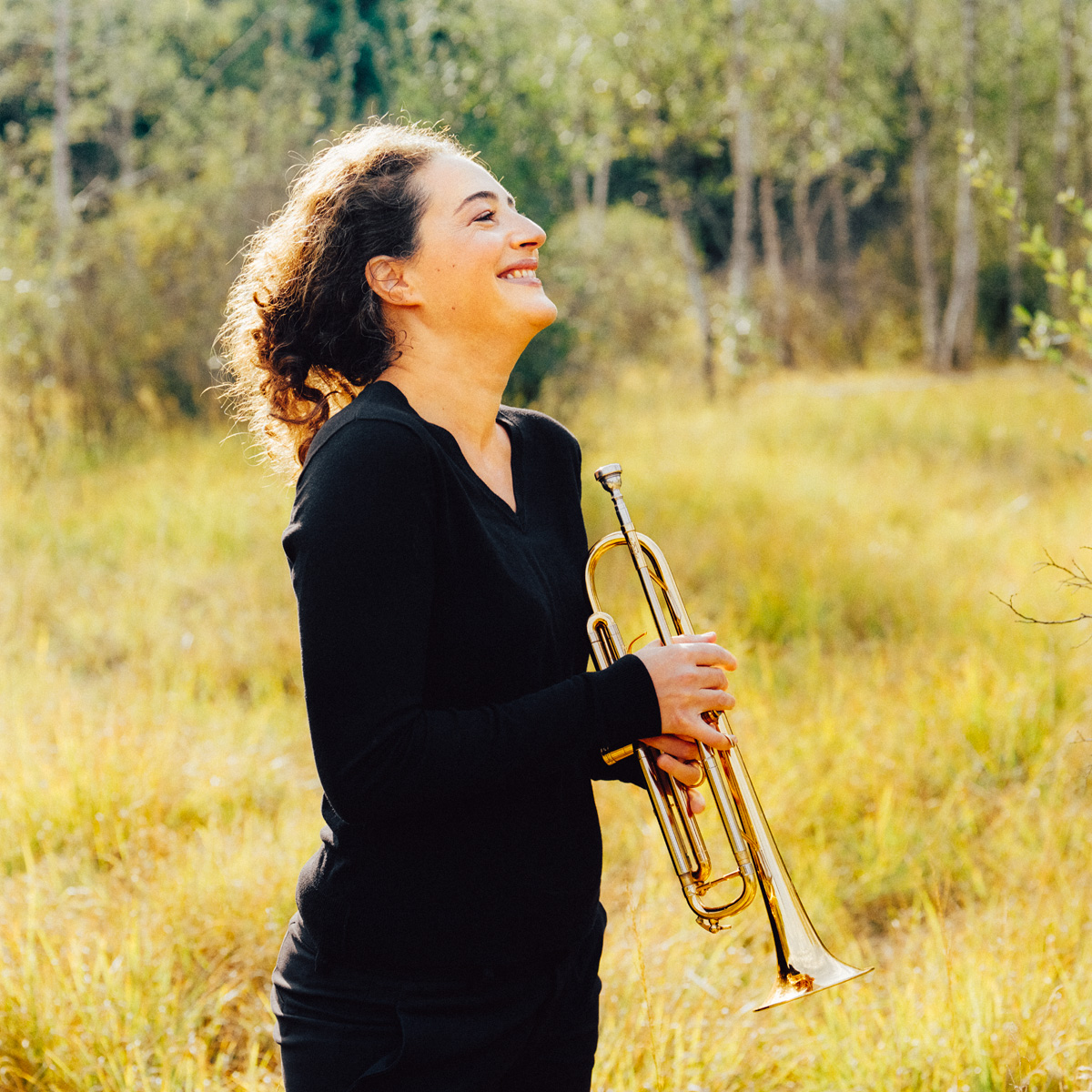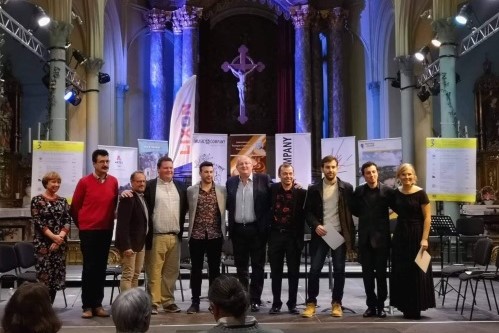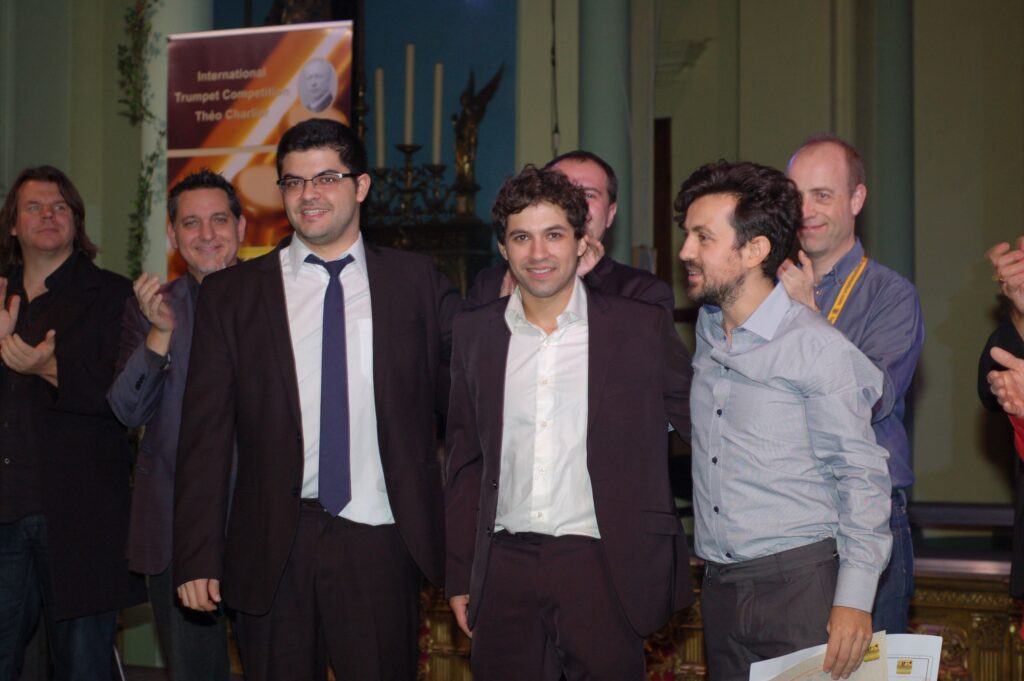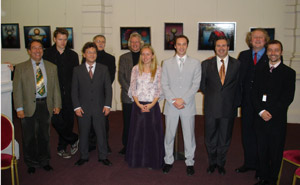
En principe, un concours d’interprétation musicale est destiné à stimuler des candidats potentiels de la région, à découvrir de nouveaux talents, mais il peut aussi s’agir de promouvoir un lieu. Que faut-il attendre des candidats ? À l’heure actuelle, les véritables défaillances techniques des candidats sont rares, car ils possèdent généralement une technique justifiée par leur présence. Toutefois, nous souhaitons que les membres du jury puissent juger de la maîtrise acoustique des lieux et de la manière dont le candidat interprète les œuvres tout en respectant les indications du compositeur. Il s’agit en fin de compte d’apprécier la musicalité de l’interprète. Pour le spectateur, c’est le moment présent qui compte et le candidat doit pouvoir donner le meilleur de lui-même. Pour le candidat, la participation à un concours devrait lui être utile, par exemple lors d’une audition d’orchestre ou lors d’un concert public.
1. Obligatory piece for trumpet solo / Barock style
First Fantasia G Major (On Bb trumpet) – G Ph Telemann/Jay Lichtmann
(Piece can be downloaded here)
2. Obligatory piece for trumpet solo / Contempory
Path – Toru Takemitsu
3. One piece for trumpet and piano to be selected from the list below
Sonate – Bohuslav Martinu
Sonatine – Jean Françaix
Sonate – Paul Hindemith
Quatre variations sur un Thème de D Scarlatti. – Marcel Bitsch
Concertino – Joseph Jongen
Quatre preludis de Llum – Albert Guinovart
1. Obligatory piece with piano
Concerto op 41 – Alexander Goedicke
2. Obligatory concerto with piano
Concerto op 17 – Léon Stekke
1. Obligatory piece
Concerto written especially for the competition by the Belgian composer Michel
Lysight.
2. Obligatory concerto
Concerto in D Major – Georg Philipp Telemann

Trumpeter, composer and arranger, Airelle Besson has made a name for herself on the European jazz scene with her clear and powerful playing. Virtuoso but never too demonstrative, her sound centres on emotion and musicality. Trained in both classical and jazz fields, her major influences are Bach and Keith Jarrett. Winner of the Django-Reinhardt prize of the Académie du Jazz and awarded the Victoires du Jazz in the “French Instrumental Revelation of the Year” category, Airelle Besson is as much a sought-after side-woman as well as a leader and an established composer.
A precocious talent
Born in Paris on March 23, 1978, Airelle Besson had a passion for the trumpet from the age of four, and began playing when she was seven. As a teenager she chose to be homeschooled, with her father’s support music was central in her education. In addition to the trumpet, she began learning the violin at nine and followed her studies in both jazz and classical music. After attending a number of conservatories, she studied musicology at the Sorbonne in Paris before entering the prestigious Conservatoire National Supérieur de Musique de Paris, from which she graduates with the first prize in jazz in 2002. Her turning point towards jazz had come during a workshop at the Cluny Jazz Festival with trumpet player Jean-François Canape.
Between electronic and acoustic
After graduating from the conservatoire, Airelle Besson teamed up with saxophonist Sylvain Rifflet to form and co-direct Rockingchair, a quintet with a rock and electronic leaning. The band released two albums, Rockingchair (2007) and 1:1 (2011). In 2013, Airelle, the group’s trumpet player, was propelled to the forefront of the European jazz scene when selected to take part in the “Take 5: Europe” programme, which opened doors to the continent’s biggest festivals (North Sea Jazz Festival, Molde Jazz Festival, Banlieues Bleues, London Jazz Festival etc). The following year, Airelle Besson transformed her longstanding friendship and collaboration with guitarist Nelson Veras into a poetic, acoustic duo in the album Prélude (Naïve Records). The album was a huge success, and the two musicians toured the international scene for several years.
Between small ensembles and large orchestras
In 2014, Airelle Besson created her own quartet with Isabel Sörling (voice), Benjamin Moussay (keyboards) and Fabrice Moreau (drums). Widely acclaimed by both the press and the public, their first album (Radio One, Naïve) is a tour de force in equilibrium and lucidity. All the melodic power of Airelle Besson’s compositions, as well as her talent for harmonisation, are elegantly displayed. Their second album, TRY! will be released on February 5, 2021. Airelle Besson increasingly devotes time to composing and arranging. In 2014, the English group Metronomy approached her for an arrangement on their album, Love Letters. Currently, 2020/21, she is artist-in-residence at the Cité musicale-Metz, where she is creating a new classical-jazz program with the Orchestre National de Metz. She will also be working with the Big Band de l’Union de Woippy on an upcoming project.
Throughout her career, Airelle Besson has been a valued member of various groups led by prestigious artists, notably in Charlie Haden and Carla Bley’s Liberation Music Orchestra in 2006. Other notable reference points are her work in duo with Vincent Ségal and Lionel Suarez, her trio formed alongside the German musicians Sebastien Sternal and Jonas Burgwinkel, and as a member of Lionel Suarez’s Quarteto Gardel with Vincent Segal and Minino Garay. In all these ensembles, as in her own groups, Airelle Besson stands out for her capacity to say a lot with a few notes. In her playing, lightness and delicacy predominate over and above her classical rigour and sheer virtuosity. Her style which embodies precision and the clarity of her message is among the best French jazz has to offer.

The village marching band and the most important international awards, the Sardinian countryside and the albums, discovering jazz and his many collaborations, his love of small things and Paris. There are not many people capable of putting together such a diverse array of elements and turn it into such an incredible and fast stylistic growth.
Paolo Fresu succeeded in a country like Italy where, for too long, jazz was famous just like Shakespeare or Matisse paintings, Armstrong was little more than a freak show and Miles Davis was acknowledged well after his creative peak. The magic lies in the spontaneous way in which he managed to convey the deepest meanings and magic of his native land with the most precious of the arts.
At this stage of his successful and long career there is no need to list recordings, awards and experiences that have made Fresu an international star, his music loved by many. Inside his trumpet sound runs the sap that has illuminated the European jazz nouvelle vague, the depth of a thought that doesn’t limit itself to music, his generosity that sees him in the right place at the right time and most of all the unending passion that always leads him.
Gala
De Bach à Piazzola
Les membres du jury, tous membres des plus grands Orchestres Internationaux vous feront partager leur passion pour cet instrument.
Un programme alléchant et brillant autours des plus grandes pages du répertoire trompettistique et lyrique.
Royal Chamber Orchestra of Wallonia
Clément Saunier (France), Klaus Bräker (Allemagne) Tamàs Palfalvi (Hongrie), Dominique Bodart (Belgique)…..
Finale
Les trois finalistes vous proposeront leur interprétation du célèbre concerto en ré Majeur TWV 51 de G. Ph. Telemann ainsi que l’œuvre imposée écrite spécialement pour le concours par le compositeur Belge Michel Lysight
Royal Chamber Orchestra of Wallonia











